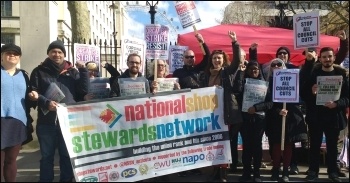Editorial of the Socialist, issue 1078
Capitalist crisis and Coronavirus:
Johnson’s budget for the bosses
Boris Johnson won the general election by trying to pose as a ‘man of the people’. Despite the rhetoric the first budget of his premiership showed clearly that, like all Tory administrations, his is a government of the capitalist class, not the working-class majority.
It came against the background of a rapidly growing global health and economic crisis. The coronavirus can infect everyone from the richest to the poorest, but while the super-rich head off on their private jets to their disaster bunkers with a personal medical team, the rest of us can only self-isolate at home, with no prospect of even being tested for the virus or of being guaranteed pay while we miss work.
The measures announced by the Tories, in the budget and subsequently, are utterly insufficient to limit the spread of Covid-19. Even the World Health Organisation (WHO) has publicly doubted the Tories’ approach.
When he was mayor of London, Johnson, asked who his favourite character was in the film Jaws, replied that it was the mayor, because he kept the beach open even while a giant fish was eating his electorate! In essence this is his government’s approach to the corona crisis. They are prioritising trying to safeguard the capitalist economy rather than the health and living standards of the population. Neither their budget nor the measures announced since will succeed in doing either, however.
World capitalist crisis
The virus is a major shock to the world economy which has laid bare its underlying weaknesses. Like the 2008 financial crash which triggered the last world economic crisis, the coronavirus is a ‘swimming naked’ moment, when as billionaire Warren Buffett once put it, the tide goes out and you find out who has been covering up their position. Twelve years on from the 2008 crisis, as we explained in last week’s editorial, none of the underlying problems in the world economy have been fixed and many have worsened – plenty of companies, banks and countries are ‘swimming naked’.
Global debt has reached unprecedented levels, equal to $86,000 for every person on the planet, almost three times the average per capita income. Corporate debt has spiralled, much of it highly leveraged. By the end of 2019, total outstanding debt among corporations other than financial institutions had surged to a record $13.5 trillion worldwide.
Now, as world stock markets plunge, there has been a flight to safer investments, leaving many heavily indebted companies in danger of collapse. As the Financial Times put it in its editorial on 14 March, the policies of the last eleven years have “resulted in an asset price bubble and an inflated debt bubble that is now collapsing. Given that financial markets are roughly four times larger than the real economy’s annual production, there is probably much more pain to come.”
The IMF last year warned that an economic crisis only half as deep as 2008 would put nearly 40% of corporate debt at risk, potentially leading to mass bankruptcies and job losses.
Capitalist commentators generally assess that the banks are – at least – in a better state than before 2008. This is not entirely true, however. Italy’s banks, in particular, remain very weak with a high percentage of bad loans. Now locked down, in the epicentre of the global pandemic, Italy is in a deep economic crisis.
For the European Union this is a Greek crisis Mark 2: but the Italian economy is far bigger than Greece’s, now the third biggest in the EU, and crisis there has the potential to stress the EU, and particularly the euro, to breaking point.
Back in 2008 the global capitalist powers cooperated in the face of their system’s crisis. They could not prevent the deepest recession since the second world war, but they were able to ameliorate the worst effects of the crisis, while – of course – storing up the problems that the world economy is now facing and offloading the cost on to working-class people and the poorest in society via austerity.
The sickness of capitalism is summed up in the fact that, despite all the money that was pumped into the economy, levels of investment – vital to develop new science, technique and methods of production – have remained at a historically low level. In Britain, for example, companies’ cash balances, about £750 billion, are a record 35% of GDP.
Today the crisis comes after years of growing national tensions, as each national capitalist class fights for its own interests at the expense of its rivals. The oil price war between Saudi Arabia and Russia, Trump’s ban on EU travel to the US, and even the comments made by Christine Lagarde, head of the European Central Bank, that the bank is not “here to close spreads” between Italy and Germany, are all indications of the extreme difficulties for the capitalist classes to act in common on a global, and even an EU, level.
Desperately scrambling to avert disaster, capitalist governments and central banks around the world are nonetheless taking emergency action to pump money into the world economy on a piecemeal basis. That was the background to the Bank of England’s cut in interest rates to 0.25% – only the second time they have been so low in the 325-year history of the bank – and the Tory government’s budget which claimed it would ‘do whatever it takes’ to get through the coronavirus.
Even before the coronavirus erupted, the British economy was heading towards recession, with 0% growth in the three months to the end of January 2020. Now the economic crisis is likely to be far more severe. The content of the budget shows, however, that the Tories have no interest in doing ‘whatever it takes’ to safeguard the interests of the majority.
Austerity lies
The capitalist media has declared that austerity is over because the Tories have ditched their mantra that government borrowing has to be slashed, which they have used to justify brutal cuts in the public sector for over a decade. In one stroke they have confirmed that the supposed necessity of austerity was a lie designed to ensure that it was decimated public services and reduced working class living standards that paid for the rescue of their crisis-hit system.
Unfortunately, the coronavirus crisis will show the result of their policies in high-relief. Britain has one of the lowest statutory sick pay levels in Europe, millions of casual workers who are not entitled to sick pay (whom the budget made no promise to assist), a brutal sanctions-driven benefit system, and an NHS which has suffered endless cuts, leaving it with the one of the lowest numbers of intensive care beds in Europe and major staffing shortfalls.
There can be no doubt that the decision to tell people who have possible symptoms of the virus not to bother phoning 111, and to stop testing anyone who is not severely ill, is not based on science – it goes directly against WHO advice – but on a lack of NHS resources.
Cuts will continue
Nor did the budget set out to start reversing the cuts that have taken place. The vast majority of the increase in spending promised by the government is for capital projects, mostly infrastructure. Day to day spending is a different story. NHS funding, as already announced by Theresa May, is to receive an extra £20 billion a year by 2023 – but this is less than the standard annual increases before the era of austerity.
In other words it will not even prevent further cuts in real terms, never mind start making up for the savage cuts of the last decade. And the NHS is getting more than most other public services. Even the most generous estimates in the capitalist press estimate that only a third of austerity would be reversed by 2024 if the budget is implemented. Local councils, for example, receive nothing.
Nonetheless, the budget once again demonstrated the tensions within the Tory Party. Both the last prime minister – Theresa May – and the last chancellor – Sajid Javid – responded in parliament to the budget by warning against ripping up the neoliberal approach of the Osborne/Cameron years.
Under the impact of the social, economic and political storms that are developing, the details of this budget will rapidly become meaningless. The tensions between the different wings of the Tory Party – ultimately reflecting the inability of the capitalist class to find a way forward as a result of the deep-rooted crisis of their system – are likely to come further to the fore. Just three months ago Johnson was celebrating a seemingly decisive election victory. Very quickly, however, his government can enter a serious, and possibly terminal, crisis.
Workers have to fight
The immediate impact of the spreading virus is inevitably shock and fear, and often a feeling that there is no choice but to rely on the government to deal with the situation. However, as the inability of the Tory ministers or their capitalist system to act effectively becomes clear, that can rapidly change to anger. Already hospital cleaners in Lewisham have taken strike action to demand their unpaid wages for an always difficult – and potentially dangerous – job.
The workers’ movement as a whole needs to urgently act to fight for the interests of the majority. That requires fighting for a programme that must include demanding full sick pay for all who need it, the requisitioning of private health facilities to cope with the crisis, and the NHS immediately stopping payments for Private Finance Initiative (PFI) debts in order to free up resources for patient care.
It also means acting to demand trade union oversight of any emergency measures. The government has decided to ban mass gatherings. May’s elections, including for mayors in London, Bristol, the Birmingham metro area, Manchester and Liverpool, have not been put back to the autumn as recommended by the Electoral Commission, but postponed for a year. If they think they can get away with it, the Tories can also use emergency legislation to prevent the effective functioning of the trade unions, including possibly banning strikes.
Collective workers’ action, however, will be essential to fight for measures that maximise safety, in contrast to the corner-cutting and profiteering which capitalism inevitably offers. In the coming weeks this can include communities coming together to organise support for the vulnerable. It will also be necessary for the workers’ movement to combat private companies raking in profits via price hikes in essential goods and foods. Doing so will require the demand for price freezes, and where companies refuse to cooperate, nationalisation under democratic workers’ control.
The role of the workers’ movement is not limited to combatting the virus, however, as the economic virus of recession is also on the agenda. British Airways, for example, has already warned of mass lay-offs. In the last economic crisis the bankers were bailed out while the rest of us suffered the worst wage restraint in over a century. Not one banker was jailed for their part in the near collapse of Britain’s financial system.
The only way to avoid a repeat performance is to fight for socialist policies. Any company threatening job losses should be forced to open their accounts to workers’ scrutiny, with popular committees of workers, trade unionists and consumer groups examining where their profits have gone and what their financial situation really is.
That is only the start of what will be necessary to end the misery caused by capitalist crisis, however. In recent days the Christian Democratic German economics minister has spoken of nationalising companies in difficulties, but only to save them before later privatisation. This is no lasting solution.
In the last economic crisis the Socialist Party campaigned for the nationalisation of the banks and the major corporations that dominate the economy, under democratic workers’ control and management, with compensation paid only on the basis of proven need. Doing so would lay the basis for developing a democratic socialist plan of production to meet the needs of the majority, and in a way that safeguards the environment.
Fundamentally, it is as a result of the last economic crisis that the concept of socialism has begun to be re-popularised globally, resulting in the support – particularly among the young – of politicians like Jeremy Corbyn and Bernie Sanders. The events ahead are going to pose the necessity of going beyond general sympathy for socialism, and building mass parties with a programme to achieve it.
This version of this article was first posted on the Socialist Party website on 14 March 2020 and may vary slightly from the version subsequently printed in The Socialist.











